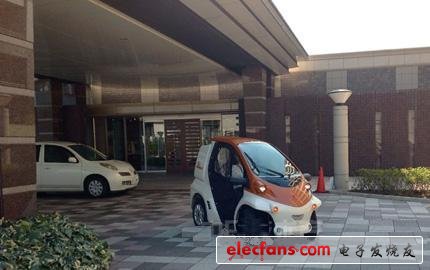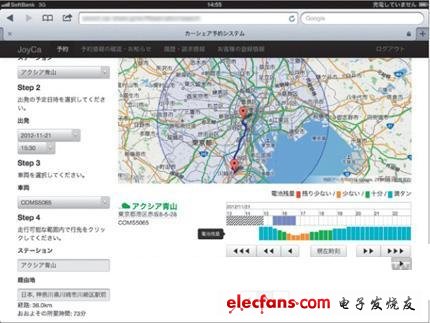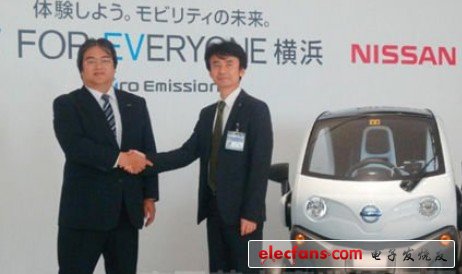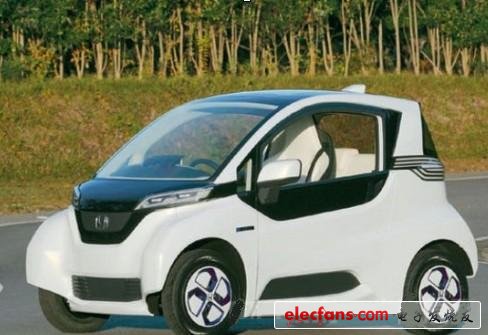Ultra-small pure electric vehicles may become a catalyst for the popularity of pure electric vehicles
The trend of popularizing ultra-small pure electric vehicles is accelerating. Relevant manufacturers are working hard to solve the problem of cruising range, exploring the niche market between motorcycles and automobiles, and ultra-small pure electric vehicles may become the detonator for the popularity of pure electric vehicles.
Toyota Tsusho Co., Ltd. began to provide premium apartment car sharing services using ultra-small pure electric vehicles in November 2012. It operates at two locations: "PRECIOUS CITY The Seasons" located on the outskirts of Nagakute City in Aichi Prefecture and "AXIA Aoyama" located in the center of Minato-ku, Tokyo. There are two and one "COMS" developed by Toyota Body Co., respectively. The price is 100 yen for 15 minutes. In addition to residents, the services provided by high-end apartments in Minato City are also open to the public.

Toyota Tsusho started to provide high-end apartment car sharing services using ultra-compact electric vehicles. The vehicle is installed at the gate entrance, so residents can use it at any time.
Predictable driving distance
The most important feature of the service is that it is equipped with a system that can predict the remaining capacity of the battery of a pure electric vehicle and the distance it can travel. The working principle of the system is to collect and store the remaining battery power during driving and the data of the amount of power recovery during charging through the on-board terminal, and display it on the reservation system in 15-minute units. When making a reservation, the user can confirm whether there is sufficient power in the battery.
Since the driving distance can be grasped, it is possible to reduce the "lack of power" that the battery runs out of power during driving. If the user specifies the destination on the reservation system screen, the system will display the round trip distance and the required time, and calculate whether the remaining power can reach the destination.

It is equipped with a reservation system for the remaining battery capacity and the distance prediction function. Because it can be confirmed whether it can go to the destination and return based on the remaining capacity of the battery, there is no need to worry about the "lack of power" when using it.
The purpose of developing this system is to improve the utilization rate of car sharing. If the remaining power cannot be accurately grasped, the user will take the charging time into account and make an appointment with the previous user for a period of time, so that the utilization rate will decrease.
Toyota Tsusho plans to provide the system to car-sharing service operators and charge usage fees. Hirata Hirata, assistant minister of the hybrid vehicle business promotion office, also said: "COMS can travel 50 kilometers after it is fully charged. Since most people travel 2 to 3 kilometers, the utilization rate can be greatly improved."
Currently in Japan, the only ultra-compact electric vehicles that can be driven on the road are COMS equipped with a prime mover. However, since only one person can ride, market demand is extremely limited. In the future, if the ultra-small pure electric vehicle that can take more than 2 people is certified, the business opportunities will be further expanded. Toyota Tsusho will accumulate relevant experience as soon as possible in preparation for full popularization.
The head of the Hybrid Vehicle Business Promotion Office, Akira Hamada, said: "We want to maximize the scope of business and firmly seize the car-sharing market." In addition to providing services for high-end apartments, the company also focuses on tourist destinations and corporate business use. Car sharing needs in areas such as cars, and plans to start business overseas.
Free rental of 8 cars in the city center
The Ministry of Land, Infrastructure, Transport and Tourism is actively promoting the use of ultra-small passenger cars, including pure electric vehicles, in order to achieve a low-carbon society and help the elderly and families with children. In June 2011, the relevant guidelines were formulated, summarizing the local government ’s considerations when discussing the use of ultra-small passenger cars for urban construction, and car manufacturers ’development. In November, a draft certification system including safety standards was announced.
On the condition of not driving on the highway, driving in a place that can ensure traffic safety, etc., the seat installation strength standard will be relaxed, so that ultra-small passenger cars can also be driven on the highway. It is expected that the notice will be announced and implemented in January 2013.
In Europe, the “L7†ultra-small passenger car category has been established, and the sales performance of Renault ’s “TWIZY†in France is also excellent.
Nissan Motor Co., which has a partnership with Renault, will sell TWIZY in Japan under the name "New Mobility Concept". The company has been conducting empirical experiments in 2011 in Kanagawa, Aomori and Awaji Islands. In November 2012, experiments began on a larger area in downtown Yokohama. By January 2013, it will be free for ordinary consumers. A total of 8 pure electric vehicles were deployed in 3 locations including the Nissan headquarters building.
The purpose of ultra-small pure electric vehicles is to provide a means of movement for tourists and the elderly who travel shorter distances. There is no need to worry about "lack of power" and no need to install charging devices everywhere.

Nissan Motor began to conduct empirical experiments in downtown Yokohama. From November 2012 to January 2013, it will be free for ordinary consumers.
Nissan has set a target of accumulating 1.5 million pure electric vehicles including Renault before FY2016. The LEAF launched in December 2010 has sold 43,000 vehicles worldwide (as of November 14, 2012), the largest number in the world, but to achieve the above goals, we need to increase sales speed.
In November, Nissan introduced the LEAF entry-level model with a price lower than the original by about 400,000 yen through simplified equipment. After using the subsidies provided by the Japanese government, the customer's burden fell below 2.5 million yen. Although the company began to increase sales promotion efforts, it still faced issues of battery life and charging time.
For Nissan, which is striving to become a "zero-emission vehicle leader (which does not emit carbon dioxide during driving)", ultra-small pure electric vehicles may be an important presence in expanding the market demand for pure electric vehicles.
Nissan Makino, director of the Nissan Zero Emissions Business Division ’s Zero Emissions Vehicle Planning Group, expressed with expectation: "I hope to create a new market that will not compete with vehicles with prime movers and light vehicles.
Other companies that are more cautious in selling pure electric vehicles have also begun to look for business opportunities in the field of ultra-small pure electric vehicles. Honda plans to start empirical experiments in the second half of 2013. The vehicle adopts a structure with a replaceable body so that it can cope with multiple uses with one chassis. Since there is no need to start development based on the chassis, it is expected to reduce costs.

A prototype developed by Honda. It is a "replacement pure electric car" that can change the car body according to the purpose.
The company will explore the establishment of a new business model, that is, instead of selling vehicles separately, it will be matched with solar power generation systems, cogeneration systems and other products owned by the group, and even be sold as a whole system including energy management.
A pure electric vehicle using a battery with a smaller volumetric energy density than gasoline as a power source is more suitable for small vehicles. If the target is aimed at a short distance, the issues such as cruising range and charging time can also be solved. Ultra-small passenger cars may become a catalyst for the popularity of pure electric vehicles.
Solar LED land lamp uses sunlight as the energy source, charges during the day and uses at night, does not need complex and expensive pipeline laying, can arbitrarily adjust the layout of lamps and lanterns, safe and energy-saving, pollution-free, stable and reliable without manual operation, saving electricity and maintenance. Solar LED street lamp is mainly composed of solar cell module (including bracket), LED lamp holder, control box (with controller, battery) and lamp pole.
Solar Led Street Light,Street Light Lamp,Solar Powered Street Lights,Solar Powered Led Street Lights
Yangzhou Heli Photoelectric Co., Ltd. , https://www.heli-eee.com